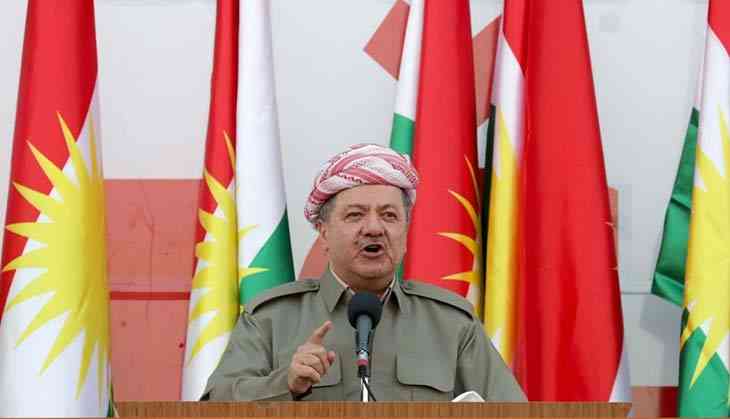The end of the Kurdish dream: Barzani forced to resign after referendum backfires

There is a famous quote by Winston Churchill that says: “Politics is almost as exciting as war, and quite as dangerous. In war you can only be killed once, but in politics many times.”
This is very true about the President of Iraq’s autonomous Kurdish region, Masoud Barzani, who will no longer exercise his functions after 1 November.
Twisting the knife in
To many, this news does not come as a surprise after a regional crisis was triggered by his call for an independence referendum in Iraqi Kurdistan on 25 September.
The counter-offensive by the Iraqi government troops and the Shi’ite militia which followed the referendum came as a severe blow to President Barzani, who has been in office since 2005.
It goes without saying that the 25 September referendum did not meet the approval of the US nor that of the government in Baghdad. Moreover, none of the important regional capitals like Tehran or Ankara were happy about the idea of a free and independent Kurdistan.
As a matter of fact, on the eve of the referendum, Iranian armed forces conducted an important military drill on the border between Iran and Iraq as a sign of warning that the Kurds should not move forward with the plebiscite.
As for Turkey, the reaction of President Recep Tayyip Erdogan was even stronger. He said that the Iraqi Kurdish authorities would pay the price for an independence referendum. Erdogan’s take on the Kurdish referendum was that the Kurds “are not forming an independent state, they are opening a wound in the region to twist the knife in.”
Meanwhile, Iran’s Supreme National Security Council asked the Iranian government to stop all flights to and from the Kurdistan region’s major airports.
As such, despite the efforts of President Barzani in the past few weeks, trying to explain to the international community that “the referendum is not for defining borders or imposing a fait accompli [but simply] a dialogue with Baghdad to resolve the problems”, the Iraqi government, the Islamic Republic of Iran, Turkey, Bashar al-Assad's Syria, the US and the international community, all refused to recognise the results of the Kurdish plebiscite.
Even the Trump administration called the referendum a “provocation” though Donald Trump had called himself “a big fan of Kurdish forces" during his Presidential campaign.
A brave fight
Strangely, the hostility, fear, intolerance or racism against the Kurdish people takes shape at a time when all the political leaders and military forces engaged in the war against ISIS recognise the Kurdish involvement in this conflict as necessary and vital.
Yet, the historical fact that the Kurdish Peshmergas stopped the march of the Islamic State into Baghdad or that the Kurdish-dominated Syrian Democratic Forces have been the most crucial military force in the campaign to retake Raqqa, did not play in the favour of President Barzani and his Kurdish followers.
Consequently, the lack of unity among different Kurdish rival political parties and different tribal affiliations helped widen the gap between Barzani and Bafel Talabani, who without any resistance allowed the Iraqi government forces and the Popular Mobilization Forces to take Kirkuk.
The end of a dream
From that day on, it was clear that nobody could stop the fall of President Barzani, who had failed to secure the Kurdish unity and gain America’s blessings.
What makes Barzani’s miscalculations so tragic is that it will postpone the Kurdish dream for independence for the next decade or two. With the fall of Barzani, Kurdish parties will have a great difficulty finding a new charismatic leader who could become the true architect of the Kurdish independence.
However, the bitter taste of defeat will stay with all the Kurds around the world, who believe that they have been betrayed by the Americans, especially after being part of a coalition that ejected Saddam Hussein and drafted the Transitional Administrative Law and the Constitution of Iraq in 2005, guaranteeing the Kurds a measure of autonomy and share in the oil revenues.
But after all, the US seemed worried not only about a debut of sectarian wars in the region after the Kurdish referendum, but also because of the fact that Iran’s Kurdish areas are safe grounds for a number of Salafist groups, including some with ties to al-Qaeda and the Muslim Brotherhood.
The suspicions of developing and sustaining a similar functioning Kurdish state in the Iranian region of Kurdistan was beyond the boundaries of an apparent partnership which continued to exist until recently between the head of Iran’s Quds Force, Qasem Soleimani, and Barzani.
One needs not to guess that the geopolitical offensive of the international community against the Kurdish referendum and Masoud Barzani resulted from the fear of destabilizing the Kurdish populations in Iran, Turkey, and Syria.
Moreover, neither Washington, nor the European capitals wanted to have another fight on their hands in the Middle East. Pressing Barzani and the Kurds is, therefore, approved by all parties involved, as a way of opposing to redraw a new map for the Middle East.
First published: 30 October 2017, 18:37 IST
